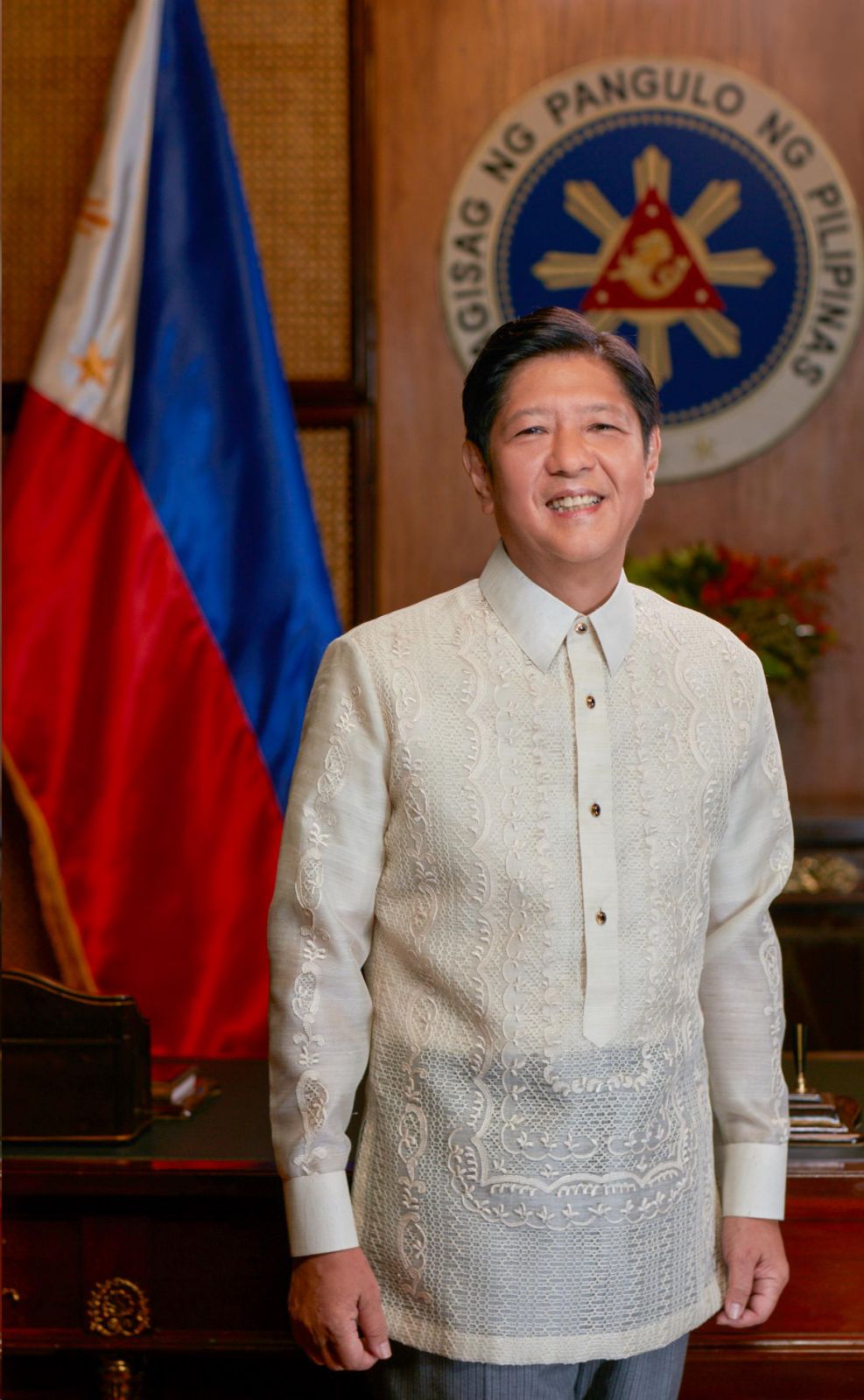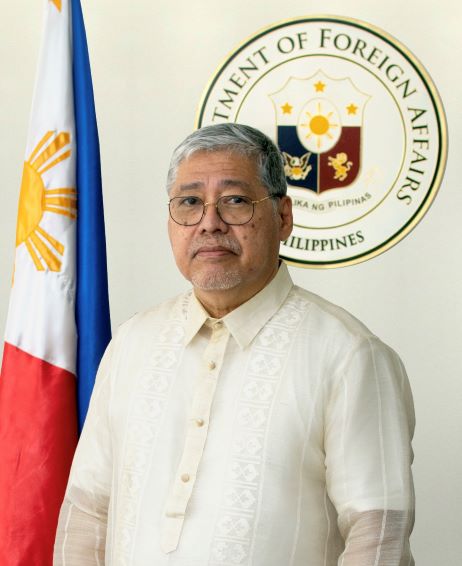DEPUTY SPEAKER LOREN LEGARDA HIGHLIGHTS PHILIPPINE WEAVING TRADITION AT RUHR UNIVERSITY

Deputy Speaker Loren Legarda delivered an engaging lecture on Philippine weaving tradition entitled, Piňa-Seda Weaving and Embroidery in the Philippines, before students and professors of Ruhr University on 15 October 2019 in Bochum, Germany.
She underscored that “the piňa–seda weaving and embroidery are only a few of hundreds of stories of the Philippine weavers.” She expressed hope that through the combined efforts of her office and the Consulate, the Philippines can further enrich the Philippine weaving tradition and make the piňa–seda textile a prized item in Germany and the rest of Europe.
The Deputy Speaker explained the process of piňa-seda weaving and embroidery for piňa-seda, and expounded on the importance of promoting traditional textiles as they bring together industries, communities, and people.
“The strengthening of the local tropical fabrics industry is attuned to our advocacy of promoting sustainable development and preserving our rich heritage. It will also provide jobs especially for those in the countryside. Furthermore, it unlocks the creativity of Filipinos, which is overflowing,” the Deputy Speaker said.
Consul General Evelyn D. Austria-Garcia expressed appreciation to Ruhr University Bochum (RUB) officials, professors and students and hoped that the Deputy Speaker’s lecture has sparked further interest in Philippine culture and studies.
The event is the first time that a high-level elected Philippine government official delivered such lecture at the German University. The activity forms part of the Consulate’s efforts to promote Philippine culture under its jurisdiction. It is also an offshoot of the Hibla ng Lahing Filipino Travelling Exhibition, an exhibition featuring piňa-seda woven and embroidered fabrics from Aklan weavers and Laguna embroiderers, that was presented by the Consulate in November last year.
The lecture signals the start of a series of lectures, conference, seminars, and other activities concerning the Philippines at Ruhr University Bochum (RUB) in line with the agreement that was signed by the Consulate and RUB to promote Philippine studies earlier in the day. END
AGREEMENT ESTABLISHES PHILIPPINE STUDIES PROGRAM IN GERMAN UNIVERSITY

An agreement between the Philippine Consulate General in Frankfurt and Ruhr University Bochum creating a Philippine studies program was signed on 15 October 2019 in Bochum, Germany.
Deputy Speaker Loren Legarda, a staunch advocate of Philippine culture and principal sponsor of the project, witnessed the signing of the agreement by Consul General Evelyn D. Austria Garcia and Prof. Axel Scholmerich, Rector of Ruhr University Bochum (RUB). After the ceremony, Deputy Speaker Legarda delivered a lecture on Philippine textile tradition to students of Ruhr University. She also visited an exhibition of Philippine ethnographic objects at the University’s exhibition area at the GA Building and participated in a roundtable discussion with University professors from different faculties with interests in the Philippines.
The agreement involves the donation of t-5,000,000 (or approximately EUR83,000) to support academic and research activities on Philippine matters, and the creation of a center that would serve as a hub for Philippine-related projects.
Ruhr University\ is one of Germany’s leading universities. It is expected to conduct courses, seminars, lectures, conferences and other activities concerning the Philippines, coordinate academic research and teaching about the Philippines, and organize research visits for scholars in the Philippines and vice-versa. RUB will also enhance its acquisition of Philippine books, journals and other publications for the University’s library.
Consul General Austria-Garcia applauded the significant support of Deputy Speaker Legarda for the project and expressed appreciation to RUB officials for their deep interest in the study of the Philippines.
‘We deeply appreciate the invaluable support of Deputy Speaker Legarda as we embark on this academic collaboration between the Consulate and RUB. We also appreciate the deep interest and commitment of officials and professors to advance Philippine studies at Ruhr University. It is my hope that this project will enhance greater understanding of the Philippines, strengthen cultural ties and people-to-people relations between our countries,” Consul General Austria-Garcia said.
Rector Prof. Scholmerich stated that the university “will do its best in implementing the programs and projects under the agreement” and expressed hope that the project would the start fruitful collaboration between the two sides.
The signing ceremony was also attended by Prof. Dr Kornelia Freitag, Vice Rector of RUB, Ms. Monika Sprung, Director for International Affairs, Prof. Roger Friedlein, Vice Consul Fatima Mejilla Mueller, and Ms. Sheree Mangunay-lnfante of the Office of Deputy Speaker Legarda.
RUB, which is located on the southern hills of central Ruhr area Bochum and about three hours away from Frankfurt, was founded in 1962 as the first new public university in Germany after World War II. END
Usec. Ernesto Abella as Guest of Honor During the 25th Anniversary of the Covenant Family of All Nations

DFA Undersecretary for Strategic Communications and Research Ernesto Abella served as the guest of honor during the 25th anniversary celebration of the Covenant Family for All Nations (CFFAN), held in Stuttgart last October 12 and 13. In his remarks, Undersecretary Abella spoke of life’s challenges and exhorted CFFAN’s members to “transform themselves through the spirit of God.” Pastor Reggie and Irma Ocampo led the 2-day celebration, with a program that included praise and worship sessions, video presentations, cultural performances and the recognition of its longest-serving members. Also present was Deputy Consul General Emil Fernandez of the Philippine Consulate in Frankfurt.


LEGARDA’S LECTURE HIGHLIGHTS POTENTIAL OF THE PIŇA-SEDA TEXTILE IN THE WORLD MARKET
Bochum, Germany — Deputy Speaker Loren Legarda today said that the Philippine piña-seda textile has great potential in the world textile market. Legarda continues to highlight the world-class talent, ingenuity and craftsmanship of the Filipino people, reflected in the traditional textiles produced through synergy among workers and artisans. Piña-seda is a traditional fabric made from pineapple silk.
Legarda made the statement during her lecture on Philippine Textiles at the Ruhr University in Bochum, Germany, saying that the Philippine piña-seda can be considered prized items even in Europe as in the past years because of the quality of the handwoven fabric with intricate embroidery.
The Deputy Speaker’s lecture marks the start of the collaboration between the Philippine government and Ruhr University to offer courses on and promote Philippine Studies.
Legarda—a staunch advocate of arts and culture promotion and patron of the country’s first permanent textile gallery, Hibla ng Lahing Filipino, which has now travelled to different parts of the world—shared how much hard work is needed to produce a fabric from piña-seda.
“A piña-seda fabric or garment is a product of diligence, hard work, and passion. For piña-seda, you would need 12 people to produce the fabric; about three people will do the embroidery work; and, two designers and sewers. This means that a handwoven and embroidered piña-seda blouse would entail at least 17 people to complete one piece,” said Legarda.
Despite the overwhelming support and patronage received from the international community by the Hibla travelling exhibitions, Deputy Speaker Legarda noted some of the continuing challenges faced in the production of piña-seda textiles, such as the limited supply of silk, supply or manufacturer of knotted pineapple fiber, and the declining number of weavers.
“Through the Hibla initiative, we have brought our weaving communities at the center stage, closer to the global arena where weaving traditions and textiles, such as piña-seda will be appreciated in a different light. However, we cannot deny factors that challenge our production of such textiles,” she said.
Legarda cited the following factors that impose constraints on the sustainability of the industry: 1) the low confidence in the profitability of sericulture and the lack of integration of the supply and value chain in silk production; 2) extreme heat during summer season, or extended periods of drought; 3) the tedious process of hand-scraping the piña fiber; 4) the irregular demand for piña cloth products due to its being a high-priced fabric; 5) the lack of capital to purchase raw materials, looms, and other tools by the workers; and, 6) the lack of training on weaving and product development.
However, Legarda said that “the local textile industry is continuously evolving and these challenges only encourage the need to innovate among stakeholders.”
“To ensure the sustainability of the local textile industry, there is a need for convergence among the agencies of government involved—from the production of raw materials, to trainings and workshops, provision of equipment and materials, product development and promotion program, and a systematic marketing system,” Legarda added.
During her stint as the Chairperson of the Senate Committee on Finance, Legarda ensured that programs that will help farmers, weavers and local textile manufacturers—such as the development of silk and piña fiber received adequate support through additional funding in the national budget.
“The strengthening of the local fabrics industry, such as the piña-seda is attuned to our advocacy of promoting sustainable development and preserving our cultural identity. The potential of Philippine piña-seda in the world textile market presents invaluable opportunity to showcase the Filipino people’s creativity, ingenuity and excellent craftsmanship,” Legarda concluded.
Legarda also authored the Philippine Tropical Fabrics Law during her first term as Senator, which aimed to promote Philippine natural fabrics through the use of such materials for the official uniforms of government officials and employees.***
50TH ANNIVERSARY OF FILIPINO NURSES WHO ARRIVED FROM THE PHILIPPINES IN 1959
The Bad Homburg group of nurses who arrived from the Philippines in 1969 celebrated their 50th anniversary with a gala dinner at the Mercure Hotel in Friedrichsdorf, Hesse on 14 September 2019. 13 of the original group of 45 nurses participated in the affair, some of whom arrived from as far as the United States and Canada. The Consulate was represented by Deputy Consul General Emil Fernandez, who lauded the group for their professionalism and adventurous spirit.






